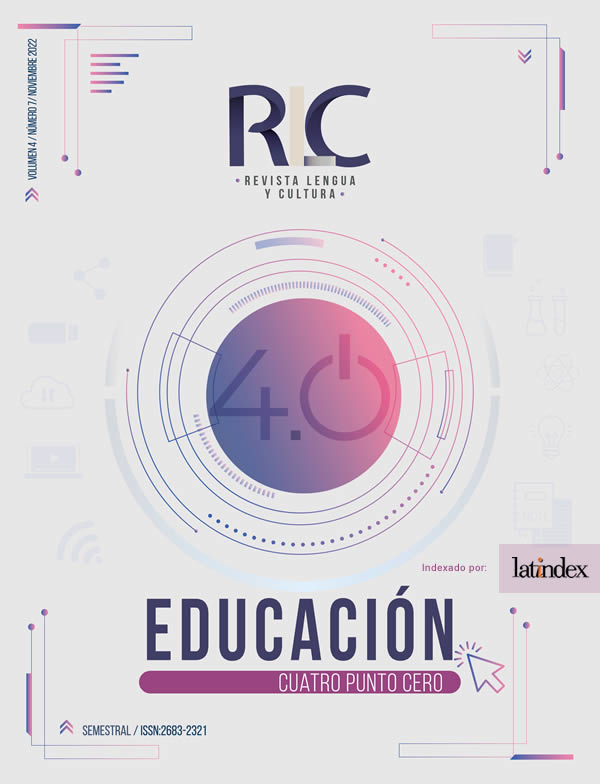Digital skills of language teachers in face-to-face modality, after COVID-19
Abstract
The objective of this qualitative research, case study, is to describe the impact of the pandemic on the teaching processes of language teachers with face-to-face classes and the need they have for training and curriculum development in digital literacy. The analysis process was carried out through the application of a semi-structured survey to a purposeful sample of participants who prefer the face-to-face modality and were forced to teach in virtual learning environments and with remote assistance for the first time during the COVID-19 pandemic. The Common European Framework digital competency dimensions were used to measure levels of digital competency proficiency. The thematic analysis was used. Themes were categorized and, in some cases, some instances were grouped into subcategories. The results and findings were taken up in combination with the presentation of descriptive graphs, tables, and mentions by the participants. It is emphasized that this research focuses on recovering the perceptions of a specific moment, group, and situation. Participants reported overcoming the digital competence challenges that were needed during the social distance period to attend the groups in remote assistance and virtually. The digital competency domains of the participants are acceptable, but there are still dimensions of digital competencies to be developed. There is a need for training of the participants in the five dimensions, which, according to the data results, should be included in the training of future language teachers.
Downloads
Literaturhinweise
Ambuludi-Marín, J. Cabrera- Berrezueta, L. (2021). TIC y educación en tiempos de pandemia: Retos y aprendizajes desde una perspectiva docente. EPISTEME KOINONIA. Volumen 4 (Número 8. 1-10. Recuperado de: http://portal.amelica.org/ameli/journal/258/2582582012/2582582012.pdf
Braun, V., y Clarke, V. (2006). Using thematic analysis in psychology. Qualitative Research in Psychology, 3(2), 77–101. https://doi.org/10.1191/1478088706qp063oa
Carretero, S., Vuorikari, R. y Punie, Y. (2017) The Digital Competence Framework for Citizens. European Commission.
Guevara, A. Evaluación del uso de las TIC en la enseñanza de idiomas. Revista RedCA. (Vol. 4). 12. 43-175
Hernández, A. (2008). La formación del profesorado para la integración de las TIC en el currículum: nuevos roles, competencias y espacios de formación. En A. García-Varcárcel (coord.). Investigación y tecnologías de la información y comunicación al servicio de la innovación educativa. (pp. 33-56). España: Universidad de Salamanca.
Kurtoglu-Hooton (2013) Providing “the Spark for Reflection from a digital platform” en J. Edge., S. Mann. Innovations in Pre-Service Education and Training for English Language Teachers. pp. 17-30.
Manisha M. (2020). Online Education Use of Apps Platforms for Online Education Use of Different E- Contents. 2(4), 17–23. https://coed.dypvp.edu.in/educational-resurgencejournal/documents/july-2020/03.pdf
Mann, S., Edge, J. (2013) Overview-Innovation as action new-in-context: an introduction to the PRESET collection. en J. Edge., S. Mann. Innovations in Pre-Service Education and Training for English Language Teachers.pp. 5-13.
Marchlik, P., Wichrowska, K., & Zubala, E. (2021). The use of ICT by ESL teachers working with young learners during the early COVID-19 pandemic in Poland. Education and information technologies, 26(6), 7107–7131. https://doi.org/10.1007/s10639-021-10556-6
Marin. A., Hernández, M. (2021). Las competencias digitales del traductor contemporáneo en México. Revista Lengua y Cultura 2(4), 1-8.
Olis, Irma María, Galindo, ÓscarJavier , Reyes, Giovanni E. (2019). Gestión, adaptabilidad y resiliencia, factores clave en el proceso de reorganización en el medio ambiente empresarial colombiano. Espacios. Volúmen 40 (Número 6) 1-15. https://revistaespacios.com/a19v40n06/a19v40n06p02.pdf
Patton, M. (2002). Qualitative Research & Evaluation Methods. 3rd edition. Sage Publications, Inc.
Raine, P. (2019) Developing Web-Based English Learning Applications: Principles and Practice. CALL-EJ, 19 (2), 125-138.
Yarosław, K., Curie, M., y Lublin, P. (2006). ICT in the Foreign Philology Curriculum – Towards a Systematic Approach to E-Teacher Training. Lublin Studies In Modern Languages And Literature 29/30, http://www.lsmll.umcs.lublin.pl
Copyright (c) 2022 Isai Ali Guevara Bazan, Verónica Rodríguez Luna, Elizabeth Salazar Ayala

Dieses Werk steht unter der Lizenz Creative Commons Namensnennung - Nicht-kommerziell - Keine Bearbeitungen 4.0 International.













